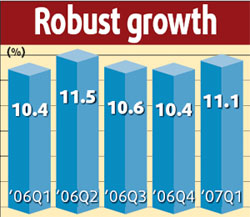All buses and taxis will be LPG-fueled in south China's Guangzhou city by 2010.
"Guangzhou will host the 2010 Asian Games, promoting clean energy for public vehicles is part of the city's strategy to improve the environment and to usher in the grand sports event," Xian Weixiong, director of Guangzhou communications commission, said.
He said 85 percent of the city's buses and taxis, 6,500 and 16,000 respectively, have already converted to LPG. The city now has the most LPG-fueled vehicles in the world.
When the conversion is completed, it will cut Guangzhou's annual diesel and gasoline consumption by 471,000 tons. Consumption is 2.50 million tons at present.
The city will also continue to find technological ways to lowering the LPG consumption of public vehicles, Xian said.
Guangzhou's target of LPG consumption per 100 km is 62 liters for buses and 12 liters for taxis by the year 2010.
Statistics show the city's buses used 65 liters of LPG per 100 km last year, compared to 83 liters in 2003. Taxis used 13.2 liters of LPG per 100 km compared to 16.6 liters for the same period.
Total LPG consumption for buses last year was 29.21 million liters less than 2005, a saving of 100 million yuan (US$13.16 million).
"Extensive use of clean energy such as LPG and efforts to lower energy consumption for public vehicles can only be beneficial to the population and the city," Yang Weiqiang, an environmental protection researcher with the Guangzhou Academy of Social Sciences, said.
Yang said Guangzhou will be able to cut the emission of carbon monoxide by 22,000 tons; hydrocarbon, 2,430 tons; nitrogen oxides, 1,779 tons; and particulate matters, 417 tons, when all its buses and taxis become LPG-fueled.
(China Daily July 6, 2007)

